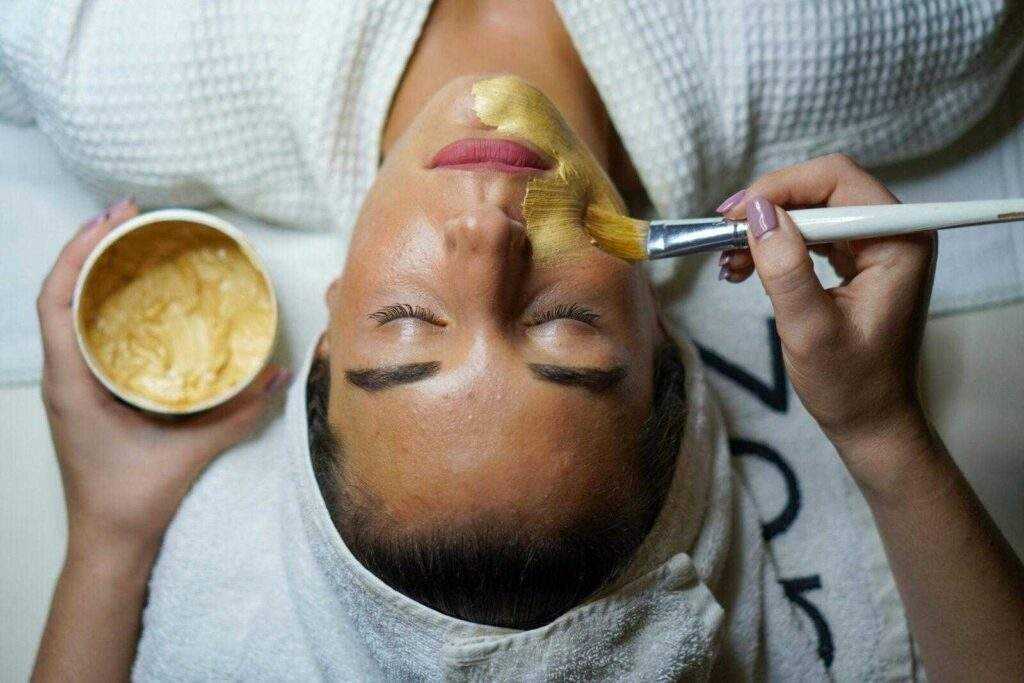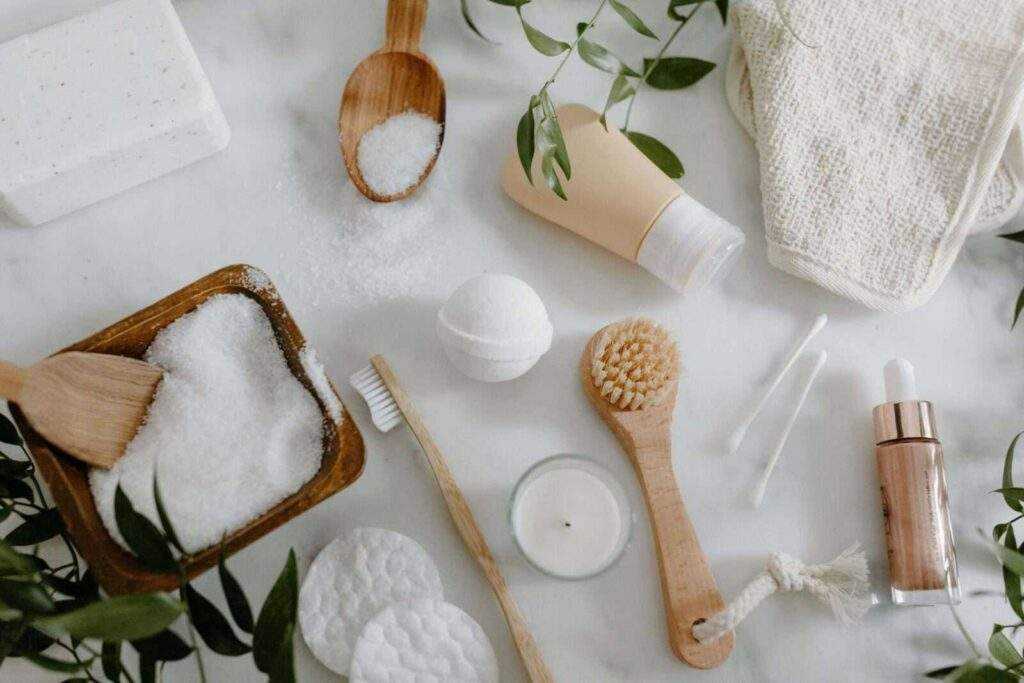Sustainable Self-Care: Reduce Waste and Embrace Eco-Friendly Pampering

Table of Contents
Self-care has become an essential aspect of modern life, crucial for maintaining mental and physical well-being. Taking time to nurture yourself through relaxing baths, skincare routines, or mindfulness practices helps to reduce stress, improve mood, and boost overall health. However, in the quest for relaxation and rejuvenation, many people overlook the environmental impact of their self-care choices.
Conventional self-care products and practices often come with hidden environmental costs. Excessive packaging, single-use plastics, and harsh chemicals are common in many beauty and wellness products. These factors contribute significantly to pollution, waste, and potential harm to both the planet and personal health. For instance, plastic packaging from skincare and beauty products contributes to the growing problem of plastic pollution in our oceans, while synthetic chemicals can leach into waterways, affecting wildlife and ecosystems.
Embracing sustainable self-care practices offers numerous advantages, making it a worthwhile transition for those looking to pamper themselves without harming the environment.
Reduced Environmental Impact
Sustainable self-care focuses on reducing waste and minimizing one’s carbon footprint. By choosing products with eco-friendly packaging, using reusable items, and opting for DIY solutions, you can significantly cut down on the waste generated by your self-care routine.
Safer Ingredients
Natural and organic self-care products are often free from harsh chemicals and synthetic ingredients. These safer alternatives not only benefit your skin and body but also reduce the amount of harmful substances entering the environment.
Cost-Effectiveness
Many sustainable self-care practices, such as making your own beauty products or using reusable items, can be more cost-effective in the long run. DIY recipes often use common household ingredients, and reusable products like cloth face pads or bamboo toothbrushes reduce the need for constant repurchases.
Empowerment and Connection
Choosing sustainable self-care practices fosters a sense of empowerment and connection to the environment. It feels good to know that your personal care choices are positively impacting the planet. This connection can enhance your overall self-care experience, promoting a sense of mindfulness and intentionality in your routine.
Incorporating sustainable practices into your self-care routine is easier than it may seem. Start by assessing your current products and practices, and look for eco-friendly alternatives. Gradually replace single-use items with reusable options, and experiment with DIY recipes for skincare and beauty products. Simple changes, such as using a bamboo toothbrush, switching to shampoo bars, or making your own facial scrubs, can make a significant difference.
Embarking on a sustainable self-care journey not only benefits the environment but also enhances your personal well-being. By making mindful choices and adopting eco-friendly practices, you can enjoy the best of both worlds—nourishing yourself while caring for the planet.

The Zero-Waste Self-Care Bathroom
A. Rethinking Your Beauty Routine
The Benefits of a Minimalist Approach
Adopting a minimalist approach to your beauty and self-care routine can significantly reduce waste, save money, and simplify your daily regimen. By focusing on essential products that truly benefit your skin and hair, you can avoid the clutter and environmental impact of unnecessary items. Minimalism encourages mindfulness and intentionality, helping you make more sustainable choices.
Evaluating Your Current Routine
Begin by assessing your current self-care products. Identify items you use regularly versus those that sit unused. Look for products with excessive packaging or those that contribute to waste. Consider streamlining your routine to include only multi-purpose, high-quality items that meet your needs without unnecessary extras.
B. Switching to Sustainable Alternatives
Hair Care
Switching to sustainable hair care products can significantly reduce plastic waste and the use of harmful chemicals. Here are some eco-friendly alternatives:
- Shampoo Bars and Solid Conditioners: These solid products often come with minimal packaging and last longer than their liquid counterparts. Brands like Ethique and HiBAR offer a variety of options for different hair types.
- DIY Hair Masks: Create nourishing hair masks using ingredients like avocado, coconut oil, and honey. For example, a simple avocado mask involves mashing one ripe avocado with a tablespoon of coconut oil and applying it to your hair for 20 minutes before rinsing.
Product Recommendations:
- Commercial: Ethique’s Heali Kiwi Shampoo Bar, HiBAR’s Solid Conditioner.
- DIY: Avocado and Coconut Oil Hair Mask (Wellness Mama’s Recipe).
Additional Resources:
- The Zero Waste Store for a variety of sustainable hair care products.
- Lush for solid shampoo and conditioner options.
Skin Care
Eco-friendly skincare alternatives prioritize natural ingredients and sustainable packaging. Consider these options:
- Cleansing Balms and Natural Oils: Cleansing balms, like those from The Clean Circle, effectively remove makeup and impurities while moisturizing the skin. Natural oils, such as jojoba or rosehip oil, can serve as both moisturizers and serums.
- Reusable Facial Cloths: Replace disposable cotton pads with reusable cloths or bamboo pads, which can be washed and reused multiple times.
Product Recommendations:
- Commercial: The Clean Circle Cleansing Balm, Marley’s Monsters Reusable Bamboo Pads.
- DIY: Mix equal parts jojoba oil and rose water for a natural moisturizer (Natural Beauty Workshop).
Additional Resources:
- Etsy for handmade and sustainable skincare products.
- The Detox Market for a wide range of eco-friendly skincare options.
Body Care
Sustainable body care options include products with natural ingredients and minimal packaging:
- Bar Soap and Bath Bombs: Choose bar soaps over liquid body washes to reduce plastic waste. Look for bath bombs made with natural ingredients and minimal packaging, such as those from Lush.
- DIY Body Scrubs: Create your own scrubs using sugar, coffee grounds, and coconut oil. For instance, a coffee scrub involves mixing 1/2 cup of coffee grounds with 1/4 cup of coconut oil and 1/4 cup of brown sugar.
Product Recommendations:
- Commercial: Lush’s Bar Soaps and Bath Bombs.
- DIY: Coffee and Coconut Oil Body Scrub (Wellness Mama’s Recipe).
Additional Resources:
- The Zero Waste Home for tips and products for a zero-waste lifestyle.
- Package Free Shop for sustainable body care products.
Reusable Tools
Incorporate reusable tools into your self-care routine to further minimize waste:
- Loofahs and Konjac Sponges: These natural exfoliating tools are biodegradable and can be composted after use. Konjac sponges, in particular, are gentle on the skin and suitable for daily use.
Product Recommendations:
- Commercial: EcoTools’ Konjac Sponge, The Earthling Co. Loofah.
Additional Resources:
- EarthHero for a variety of sustainable self-care tools.

C. Minimizing Waste in Your Routine
Tips for Reducing Waste
Shop with Reusable Containers: Invest in refillable containers or buy products in bulk to minimize single-use packaging. Stores like Lush and The Refill Shoppe offer options for refilling products like shampoo, conditioner, and lotion.
Embrace DIY Practices: Making your own beauty products can be both fun and sustainable. DIY recipes often use simple, natural ingredients that are readily available. Websites like Wellness Mama and The Natural Beauty Workshop provide a plethora of recipes for everything from face masks to body lotions.
Extend Product Life: Use every bit of a product before discarding it. For example, cut open tubes to access the remaining contents or add a bit of water to liquid products to extend their use. Consider creative reuses for empty containers, such as using jars for storage or repurposing bottles as plant sprayers.
Additional Resources:
- The Refill Shoppe for bulk buying and refilling options.
- Wellness Mama for DIY beauty product recipes.
- The Natural Beauty Workshop for homemade beauty recipes.
Transitioning to a zero-waste self-care bathroom not only benefits the environment but also enhances your well-being. By rethinking your beauty routine, switching to sustainable alternatives, and minimizing waste, you can create a more eco-friendly and mindful self-care regimen. Embrace these changes and enjoy the positive impact on both your health and the planet.
Sustainable Self-Care Beyond the Bathroom
A. Eco-Friendly Relaxation Techniques
Nature Immersion
Spending time in nature is one of the most effective and eco-friendly ways to relax. Nature immersion offers numerous mental and physical health benefits, including reduced stress, improved mood, and enhanced overall well-being. Activities like hiking, walking in a local park, or simply sitting in a garden can provide a profound sense of peace and connection with the natural world.
Additional Resources:
- AllTrails for finding nearby hiking trails.
- The Nature Conservancy for information on protected areas and nature preserves.
Mindfulness Practices
Mindfulness practices such as meditation, yoga, and deep breathing are excellent for achieving inner peace without any environmental impact. These practices help cultivate a sense of calm, reduce anxiety, and improve focus.
Guided Meditations:
- Headspace offers a variety of guided meditations.
- Calm provides resources for meditation and mindfulness exercises.
Yoga Routines:
- Yoga with Adriene on YouTube offers free yoga routines for all levels.
- Glo offers a subscription service with a wide range of yoga and meditation classes.
Digital Detox
Taking a break from technology allows you to unwind and reconnect with yourself. A digital detox involves setting aside specific times to disconnect from screens, social media, and other digital distractions. This practice can help reduce stress, improve sleep, and enhance your ability to be present in the moment.
Resources for Digital Detox:
- Digital Detox offers tips and programs for reducing screen time.
- Unplug Collaborative promotes the benefits of unplugging and offers resources for a successful digital detox.

B. Sustainable Spa Treatments at Home
DIY Bath Salts and Scrubs
Creating your own bath salts and scrubs using natural ingredients is a simple and sustainable way to enjoy a spa-like experience at home. These DIY treatments are free from harsh chemicals and can be customized to your preferences.
DIY Bath Salts Recipe:
- 1 cup Epsom salts
- 1/2 cup sea salt
- 10-15 drops of essential oil (e.g., lavender for relaxation, eucalyptus for invigoration)
- Optional: dried herbs or flowers (e.g., chamomile, rose petals)
Mix all ingredients in a bowl and store in a glass jar.
DIY Body Scrub Recipe:
- 1/2 cup sugar (white or brown)
- 1/4 cup coconut oil
- 10 drops of essential oil (e.g., peppermint for a refreshing scrub)
- Optional: 1 tablespoon ground coffee for exfoliation
Mix all ingredients in a bowl and store in a reusable container.
Additional Resources:
- Wellness Mama for more DIY beauty recipes.
- The Natural Beauty Workshop for homemade skincare ideas.
Upcycled Self-Care Tools
Repurposing old items into self-care tools is both eco-friendly and budget-conscious. For example, old scarves can be transformed into soothing eye masks, and reusable heating pads can be made from fabric scraps and filled with rice or dried beans.
DIY Heating Pad Instructions:
- Sew two pieces of fabric together, leaving one side open.
- Fill with rice or dried beans.
- Sew the remaining side shut.
- Heat in the microwave for 1-2 minutes for a reusable heating pad.
Candles with Sustainable Waxes
Using candles made from sustainable waxes like soy or beeswax ensures a cleaner burn and a reduced environmental footprint compared to paraffin wax candles. These natural waxes are biodegradable and produce less soot.
Product Recommendations:
- Paddywax offers a range of soy wax candles.
- Bee’s Wrap for beeswax wraps and products.
Additional Resources:
- Etsy for handmade, sustainable candles.
- The Zero Waste Store for eco-friendly self-care items.

C. Sustainable Self-Care on a Budget
Buy in Bulk or Share Products
Purchasing self-care products in bulk can reduce packaging waste and save money. Additionally, sharing products with friends and family allows you to try new items without committing to full-sized purchases, which minimizes waste and cost.
Resources for Bulk Buying:
- Bulk Apothecary for bulk ingredients and containers.
- The Refill Shoppe for refillable self-care products.
Secondhand Stores for Self-Care Items
Thrift stores and secondhand shops can be treasure troves for self-care items like bathrobes, towels, and spa accessories. Buying secondhand reduces waste and supports a circular economy.
Online Thrift Stores:
- ThredUP for secondhand clothing and accessories.
- Poshmark for pre-loved self-care items.
DIY Beauty Recipes
Creating your own beauty products using readily available ingredients is both economical and sustainable. Many DIY recipes use simple items found in most kitchens, such as sugar, salt, oils, and herbs.
DIY Recipes:
- Face Mask: Mix 1 tablespoon of yogurt with 1 teaspoon of honey and apply to the face for 10-15 minutes before rinsing.
- Hair Rinse: Combine 1 part apple cider vinegar with 2 parts water for a natural hair rinse that adds shine and balances pH.
Additional Resources:
- Wellness Mama for a variety of DIY beauty and self-care recipes.
- The Natural Beauty Workshop for homemade skincare and haircare ideas.
Incorporating sustainable self-care practices beyond the bathroom not only benefits the environment but also enhances your overall well-being. From eco-friendly relaxation techniques and DIY spa treatments to budget-conscious self-care strategies, there are numerous ways to pamper yourself sustainably. Embrace these changes and enjoy the positive impact on both your health and the planet.

Living a Sustainable Self-Care Lifestyle
A. Beyond the Individual: Eco-Conscious Consumerism
Supporting Sustainable Brands and Businesses
Incorporating sustainable self-care practices into your life involves making conscious choices about the products you use. By supporting sustainable brands and businesses, you can contribute to a healthier planet while enjoying high-quality self-care products. Here’s how to choose eco-friendly products:
- Look for Certifications: Certifications such as Leaping Bunny (cruelty-free), USDA Organic, and Fair Trade ensure that products meet certain environmental and ethical standards. These certifications help you make informed decisions about the products you buy.
- Research Brands: Investigate a brand’s sustainability practices and commitment to ethical sourcing. Look for companies that prioritize reducing their carbon footprint, use sustainable packaging, and support fair labor practices.
- Check Ingredients: Choose products made with natural, organic ingredients that are free from harmful chemicals. Avoid products containing parabens, sulfates, and synthetic fragrances.
- Sustainable Packaging: Opt for brands that use recyclable, compostable, or refillable packaging. Many companies now offer zero-waste options that reduce plastic waste.
Resources:
- Environmental Working Group (EWG) for information on product safety and sustainable brands.
- Sustainable Jungle for reviews of eco-friendly products and brands.
B. The Power of Community and Shared Experiences
Group Hikes or Nature Walks
Engaging in sustainable self-care practices with friends and family can enhance your experience and foster social connections. Group hikes or nature walks provide an opportunity to enjoy the outdoors, reduce stress, and connect with loved ones.
Resources:
- AllTrails for finding local hiking trails and nature walks.
DIY Beauty Swaps
Hosting DIY beauty swaps with friends is a fun way to share recipes and create self-care products together. This not only reduces waste but also allows you to exchange ideas and learn new techniques.
Resources:
- Wellness Mama for DIY beauty recipes.
- The Natural Beauty Workshop for homemade skincare and haircare ideas.

Supporting Local Businesses
Patronizing local farmers markets for natural ingredients and eco-friendly shops for self-care tools helps support your community and promotes sustainable practices. Local businesses often prioritize sustainability and ethical sourcing, making them a great choice for eco-conscious consumers.
Resources:
- Local Harvest for finding farmers markets and local producers.
- Buy Local for resources on supporting local businesses.
C. Sustainable Self-Care for Different Needs
Sustainable Self-Care for Busy Schedules
Even with a busy schedule, you can incorporate sustainable self-care practices that require minimal time commitment. Short guided meditations, quick DIY face masks with readily available ingredients, and brief nature walks can help you recharge without taking up much time.
Quick Self-Care Ideas:
- Guided Meditations: Headspace offers quick meditation sessions.
- DIY Face Masks: Mix 1 tablespoon of yogurt with 1 teaspoon of honey for a quick, soothing mask.
Sustainable Self-Care on a Budget
Cost-saving strategies for sustainable self-care include buying in bulk, sharing products with friends, and exploring free activities like journaling or spending time in nature. These practices not only save money but also reduce waste.
Budget-Friendly Self-Care:
- Bulk Buying: Bulk Apothecary for affordable ingredients.
- Journaling: Using recycled paper notebooks for mindful journaling.
Sustainable Self-Care for Mental Health
Eco-friendly practices can complement traditional mental health strategies. Mindfulness practices in nature, creating a calming and natural spa environment at home, and engaging in eco-conscious activities can improve mental well-being.
Mental Health Practices:
- Mindfulness in Nature: Practicing mindfulness during a nature walk can reduce anxiety and improve mood.
- Eco-Friendly Spa: Create a calming spa environment with soy wax candles and natural bath salts.
Resources:
- Mindful for mindfulness exercises and resources.
- EcoTherapy for information on nature-based mental health practices.
Living a sustainable self-care lifestyle involves making eco-conscious choices that benefit both your well-being and the planet. By supporting sustainable brands, engaging in community activities, and adapting self-care practices to your needs, you can create a holistic and environmentally friendly approach to self-care. Embrace these practices and enjoy the positive impact on your health and the environment.
Sustainable self-care practices not only benefit your well-being but also positively impact the planet. By choosing eco-friendly alternatives, supporting sustainable brands, and reducing waste, you contribute to a healthier environment and enhance your personal self-care routine.

Key Takeaways:
- Environmental Impact: Sustainable self-care reduces your carbon footprint and minimizes waste, promoting a healthier planet.
- Health Benefits: Using natural, organic products ensures safer ingredients, promoting overall health and wellness.
- Cost-Effectiveness: DIY practices and reusable products can save money in the long run.
- Empowerment: Creating your own self-care products provides a sense of satisfaction and connection to the natural world.
Actionable Steps:
- Start Small: Begin by incorporating one or two sustainable practices into your existing routine. This could be switching to a reusable product or trying a DIY recipe.
- Explore Resources: Use the tips and resources provided throughout this blog to find inspiration and guidance. Research sustainable brands and DIY recipes to expand your eco-friendly self-care options.
- Share Your Journey: Encourage others to embrace sustainable self-care by sharing your experiences. Social media platforms, community groups, and personal conversations can help spread awareness and inspire change.
The Future of Sustainable Self-Care
The trend of sustainable self-care is growing rapidly, reflecting a broader shift towards eco-conscious living. As consumers become more aware of the environmental impact of their choices, the demand for sustainable products continues to rise.
Industry Impact:
- Increased Availability: More brands are recognizing the importance of sustainability and are offering eco-friendly products. From biodegradable packaging to ethically sourced ingredients, the market is evolving to meet consumer demands.
- Consumer Awareness: People are becoming more informed about the benefits of sustainable self-care. This growing awareness drives changes in purchasing behavior, encouraging more brands to adopt sustainable practices.
- Innovative Solutions: The beauty and wellness industry is continuously innovating, with new sustainable solutions emerging regularly. From refillable packaging to plant-based ingredients, the future of self-care looks promising and green.
Additional Resources
To continue your journey towards sustainable self-care, explore these curated resources for further information and inspiration:
Websites and Blogs:
- Eco Warrior Princess: A blog focusing on sustainable living, including eco-friendly beauty and self-care tips.
- Sustainable Jungle: Provides reviews and guides on sustainable products and practices.
Online Stores:
- Package Free Shop: Offers a wide range of zero-waste and sustainable self-care products.
- Earth Hero: Sells eco-friendly and sustainable products, including self-care items.
Books and Articles:
- “The Green Beauty Guide” by Julie Gabriel: A comprehensive guide to natural and organic beauty products.
- “Sustainable Home: Practical Projects, Tips and Advice for Maintaining a More Eco-Friendly Household” by Christine Liu: Offers tips on sustainable living, including self-care practices.
By incorporating these resources into your routine, you can continue to learn, grow, and embrace a sustainable self-care lifestyle. Your commitment to eco-conscious choices will not only enhance your well-being but also contribute to a healthier planet for future generations.
Start your sustainable self-care journey today, and inspire others to do the same. Together, we can make a significant impact on our well-being and the environment, one small step at a time.
Sustainable Self-Care FAQs: Unwind and Replenish, Guilt-Free!
Embracing sustainable self-care is a fantastic way to pamper yourself while doing good for the planet. Here are some common questions to address any concerns you might have:
1. Isn’t sustainable self-care more expensive?
Not necessarily! While some high-end eco-friendly products can be pricier, there are many ways to save:
- Shop strategically: Look for products with minimal packaging, buy in bulk when possible, and explore refillable options.
- Embrace DIY: Many natural self-care products can be made at home using readily available ingredients.
- Invest in reusables: Reusable items like facial cloths, makeup wipes, and menstrual cups can save you money in the long run.
2. Does sustainable self-care take a lot of time?
It doesn’t have to! Even small changes can make a big difference. Here are some time-saving tips:
- Multitask: Combine self-care with other activities, like listening to a calming meditation while taking a bath.
- Embrace quick practices: Short guided meditations, DIY face masks with a few ingredients, or spending time in nature can be incredibly rejuvenating.
- Plan your self-care: Schedule time for self-care activities in your week to ensure you prioritize your well-being.
3. Is sustainable self-care effective?
Absolutely! Eco-friendly self-care practices can be just as effective, if not more, than traditional methods:
- Natural ingredients: Many natural products are gentle and effective for your skin and hair.
- Mindfulness focus: Sustainable self-care often emphasizes practices like meditation and spending time in nature, which are proven to reduce stress and improve well-being.
- Empowerment: Taking control of your self-care routine and making eco-conscious choices can be incredibly empowering.
4. I have sensitive skin. Can I still use sustainable self-care products?
Certainly! Many eco-friendly products are formulated for sensitive skin. Look for products labeled “hypoallergenic” and free of harsh chemicals. Additionally, DIY options allow you to choose ingredients that work best for your specific needs.
5. Where can I find eco-friendly self-care products?
There are many options! Local farmers markets often offer natural ingredients for DIY projects. Eco-friendly online stores and boutique shops specialize in sustainable self-care products. Research brands that prioritize ethical sourcing and sustainable packaging.
6. What are some sustainable alternatives for my favorite beauty products?
There are fantastic eco-friendly options for most beauty products!
- Hair: Explore shampoo bars, solid conditioners, and natural hair masks made with nourishing ingredients.
- Skin: Consider cleansing balms, reusable facial cloths, and natural oils for a gentle and effective skincare routine.
- Body: Opt for bar soap, bath bombs made with natural ingredients, and DIY body scrubs using sugar or coffee grounds.
7. How can I make my self-care routine more sustainable?
Here are some easy ways to get started:
- Swap single-use products: Replace cotton pads with reusable options, invest in a menstrual cup, and consider a safety razor.
- Extend product life: Use all of a product before discarding it. Explore creative ways to reuse empty containers.
- Shop with reusable bags: Avoid single-use plastic bags when purchasing self-care products.
8. I’m not crafty. Can I still do DIY sustainable self-care?
Absolutely! Many DIY recipes require minimal effort and commonly available ingredients. Explore online resources for simple yet effective recipes, like sugar scrubs or face masks with honey and yogurt.
9. How can I incorporate sustainable self-care with friends and family?
Sharing sustainable self-care practices with loved ones can be fun and inspiring!
- Organize group outings: Plan hikes, nature walks, or park picnics for a bonding and eco-friendly experience.
- Host DIY beauty swaps: Share recipes and create self-care products together.
- Support local businesses: Patronize farmers markets for local ingredients or eco-friendly shops for self-care tools.
10. Is there anything I can’t recycle in my bathroom?
While it varies by location, most cosmetic containers with recycling symbols can be recycled. However, avoid putting items like cotton balls, used tissues, and applicators in your recycling bin. Check with your local recycling guidelines for specific instructions.








